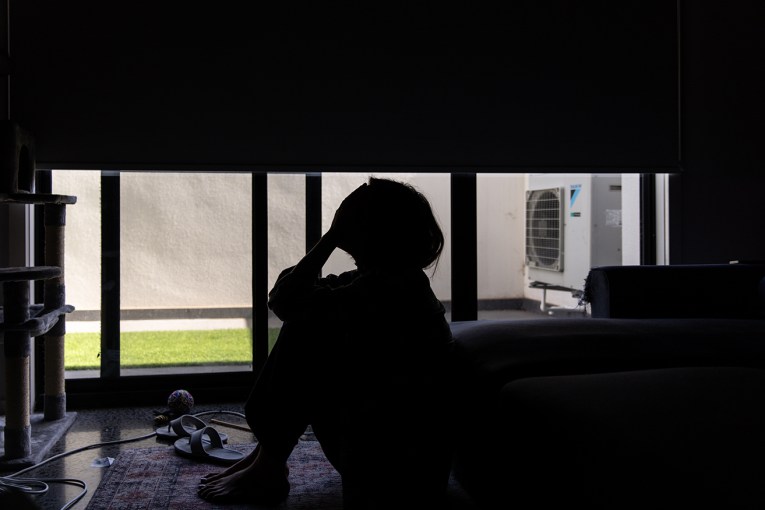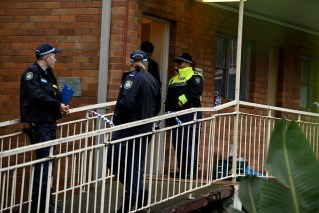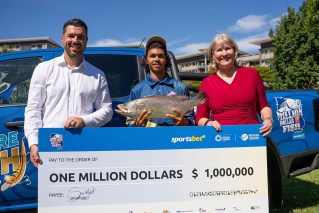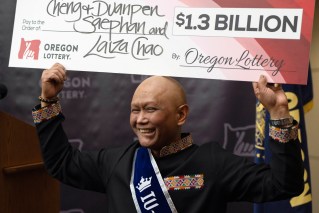Beaten teen Andreeva sure she can outgrow tantrums
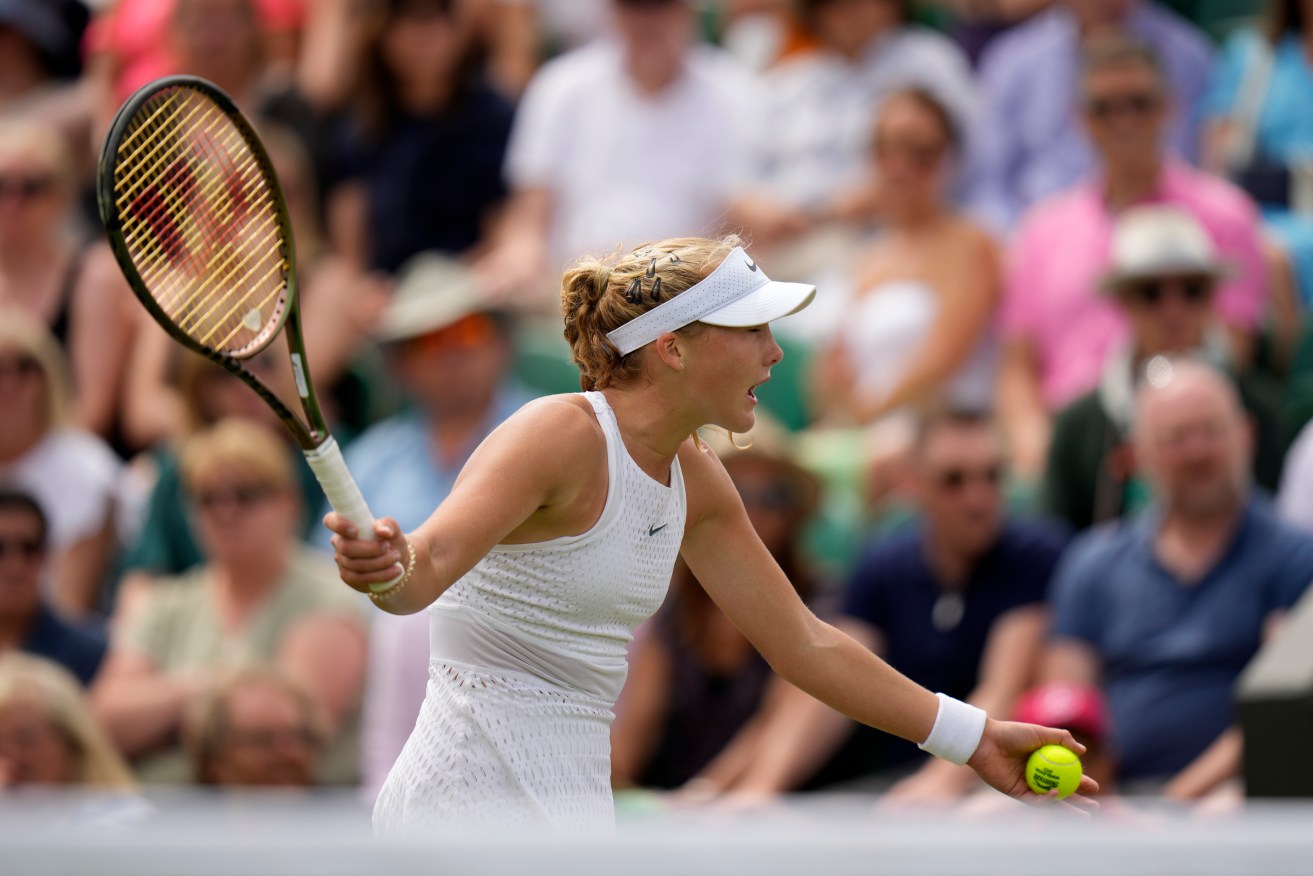
Russian Mirra Andreeva speaks with chair umpire Louise Azemar Engzell over a disputed decision. Photo: AAP
Teen prodigy Mirra Andreeva, the 16-year-old Russian who has been one of the stars of this year’s Wimbledon, says she will work on her attitude after exploding against an umpire decision.
Andreeva argued against a controversial racquet-throwing call and later snubbed the umpire – refusing to shake her hand – after losing to 25th-seeded Madison Keys.
Anreeva had looked set to become the youngest player since Anna Kournikova in 1997 to make the quarter-finals when she led by a set and 4-1.
However, she let a big lead over Keys slip away in a 3-6 7-6 (7-4) 6-2 loss on No. 2 Court on Monday (British time).
As Keys fought back, Andreeva was given her first umpire warning after flinging her racquet across the grass when she lost the second-set tie-break.
She then appeared to slam her racquet to the ground again when Keys forced deuce at 2-5 in the deciding set, earning a second warning and an automatic point penalty, which gave her opponent a match point.
Andreeva argued her case, saying: “Do you understand what you are doing? I didn’t throw the racquet. I slid. It’s the wrong decision. I slid and then I fell.”
But the decision stood and Keys won the next point to clinch a 3-6 7-6 (7-4) 6-2 victory, with Andreeva heading to the net to briefly shake hands with her opponent but walking straight past the umpire.
The Russian said afterwards: “She’s the umpire. She’s the one who makes the decision. But, honestly, I didn’t have any intention to throw the racquet. I slid. I thought that I will fall forward. Maybe it did look like I threw the racquet.
“For me, she didn’t do a right decision. That’s why I didn’t want to shake hands with her.”
Andreeva, who had feared being defaulted after whacking a ball angrily into the crowd at the French Open, is working through the temperament issue by talking to herself in bed every night.
She has taken encouragement from the way Roger Federer overcame teenage tantrums.
“I knew that Federer was struggling with emotions when he was teenager,” she said.
“Actually when I was younger, I saw that, ‘Well, he was struggling also. I’m not the only one who also struggles’.
Now 28, Keys was once a teenage prodigy, and, asked what advice she would give Andreeva, she said: “I would say ignore everyone, and everything that they say, unless you actually care about their opinion.”
Alcaraz, Djokovic, Medvedev win, but Eubanks headlines
Defending champion Novak Djokovic has won his 100th Wimbledon match to move into the quarter-finals, where he has been joined by No.1 seed Carlos Alcaraz and third-seeded Daniil Medvedev.
But the headline act on the championships’ eighth day was a hitherto little-known American.
Big-serving Chris Eubanks made a mark at the weekend in Australia when he ended the nation’s hopes by knocking out Chris O’Connell.
But gentle giant has been noticed by the wider world after Monday’s fourth round 3-6 7-6 (7-4) 3-6 6-4 6-4 win over Greek fifth seed Stefanos Tsitsipas.
Eubanks, 27, is no spring chicken. But after finally making it into the Wimbledon main draw for the first time, he has made it into the quarter-finals of a grand slam for the first time.
The 24-year-old Tsitsipas, who was in action for the seventh day running after having to put up with numerous rain disruptions during his matches, was bidding to become the first Greek man to reach the last eight at the All England Club.
But he met his match in the 2.01-metre Eubanks, whose cheering squad included his occasional mixed doubles partner Coco Gauff.
“I feel like I am living a dream right now, this is absolutely insane,” he said. “It’s surreal, it’s unbelievable, I can’t believe it.”
Tweet from @Wimbledon
Eubanks now meets Daniil Medvedev, who reached the quarter-finals for the first time when Jiri Lehecka retired injured after losing the first two sets 6-4 6-2.
Lehecka, 21, who had played a four-hour five-set match against Tommy Paul in the last round, had treatment for blisters on his right foot after the first set.
Djokovic was temporarily knocked off course by big-serving Pole Hubert Hurkacz but quickly got back in the groove to book a match with Russian seventh seed Andrey Rublev on Tuesday.
Having edged two tiebreaks late on Sunday before being beaten by the tournament’s 11pm curfew, the 36-year-old returned to lose his first set of the slam before sealing a 7-6 (8-6) 7-6 (8-6) 5-7 6-4 victory.
Alcaraz lost the first set against 2021 finalist Matteo Berrettini, but then showed his class to win 3-6 6-3 6-3 6-3.
He next meets sixth-seeded Dane Holger Rune, another 20-year-old, who also dropped the first set. He, too, recovered to win in four defeating Grigor Dimitrov 3-6 7-6 (8-6) 7-6 (7-4) 6-3.
Men’s quarter-finals (seed in brackets): Carlos Alcaraz (1) v Holger Rune (6), Daniil Medvedev (3) v Chris Eubanks, Jannik Sinner (8) v Roman Safiullin, Andrey Rublev (7) v Novak Djokovic (2).
